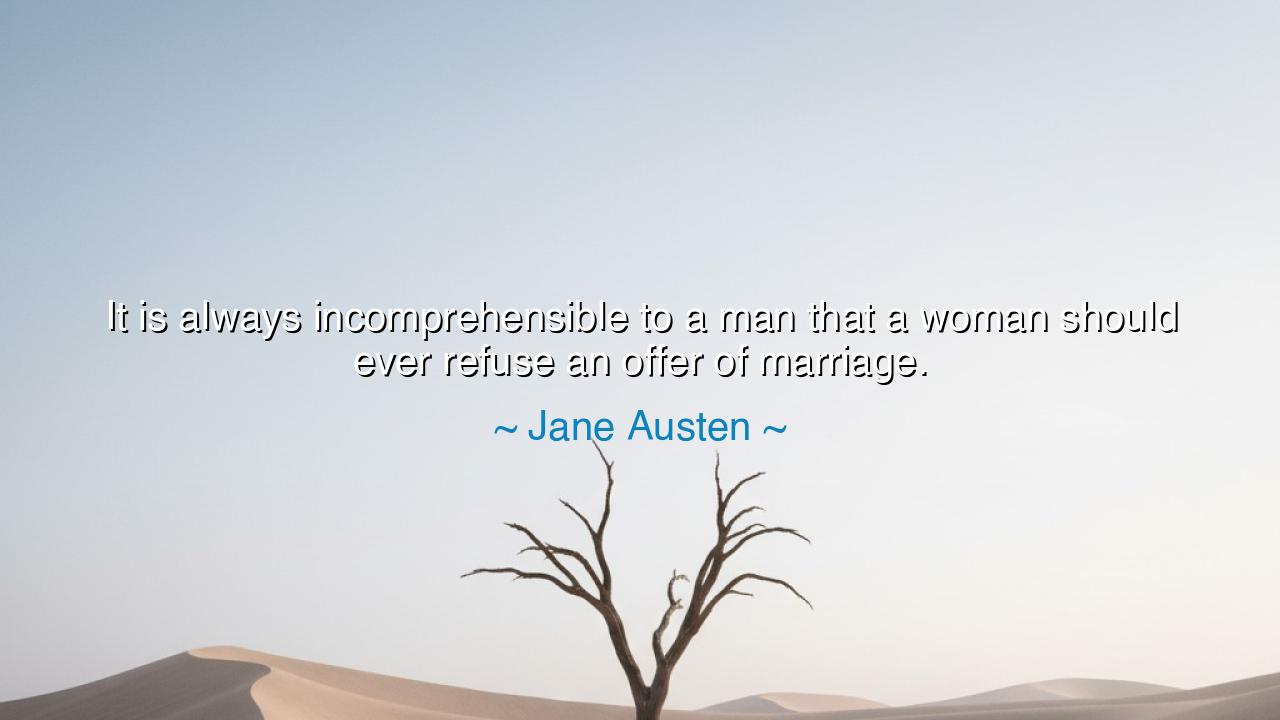
It is always incomprehensible to a man that a woman should ever
It is always incomprehensible to a man that a woman should ever refuse an offer of marriage.






When Jane Austen observed, “It is always incomprehensible to a man that a woman should ever refuse an offer of marriage,” she was not merely describing the social custom of her day, but unveiling a truth about pride, expectation, and misunderstanding between the sexes. Her words, sharpened with wit, pierce through the layers of tradition to reveal the imbalance that existed in the hearts of men who believed their proposals were gifts too valuable to decline. In her time, marriage was often less a covenant of love and more a transaction of status, wealth, and survival. To refuse such an offer seemed irrational to men accustomed to their own authority, yet to women, refusal was sometimes the only way to preserve dignity and freedom of spirit.
The meaning of this quote rests in the contrast between expectation and autonomy. Men, raised to believe themselves the arbiters of choice, saw their offers of marriage as irresistible blessings, a prize that no woman in her right mind should decline. But Austen, with her keen eye and iron pen, reminds us that women are not mere recipients of fortune, but beings of will and discernment. A woman may decline, not from folly, but from wisdom—knowing that love without respect, or security without happiness, is no true gain. Her refusal becomes an act of courage, a declaration that her worth is not bound to a man’s offer, no matter how esteemed.
The origin of Austen’s remark lies within the society of Regency England, where marriage defined a woman’s future, often being her sole avenue of financial stability and social standing. Yet Austen, who herself refused more than one proposal, lived by the truth she wrote. In her novels, such as Pride and Prejudice, she gave voice to women who dared to reject unsuitable offers. Elizabeth Bennet’s refusal of Mr. Collins is the very embodiment of this wisdom. To Collins, a clergyman who viewed his proposal as a magnanimous act, Elizabeth’s rejection was indeed “incomprehensible.” Yet to Elizabeth, acceptance would have been a surrender of her spirit.
History too offers us examples of women who, in refusing marriage, declared themselves free. Consider Queen Elizabeth I of England, who rejected many suitors and chose to remain unmarried. To the kings and princes who sought her hand, her refusals were baffling, even insulting. Yet she declared herself married to her kingdom, devoting her life to sovereignty rather than to a man. Her refusal was incomprehensible to those who saw marriage as her duty, yet it preserved her power and defined an age. Through her, we see how the right to refuse shapes destiny itself.
The wisdom of Austen’s words is enduring. They remind us that what seems incomprehensible to the privileged is often the voice of freedom to the marginalized. Men may have believed refusal irrational because they never bore the cost of marrying without choice. Women, however, bore that weight in silence. Austen’s observation shatters the illusion of male certainty, showing that women, too, must be free to discern their paths.
The lesson is clear: never presume your offer—be it of love, work, or alliance—is too precious to be refused. Respect the freedom of another to decline, for in that freedom lies their dignity. A true union, whether of hearts or of hands, must be born not of obligation but of mutual desire. When rejection comes, do not call it folly; see it as truth, and honor it.
What then must the listener do? If you seek marriage, seek not only to offer, but to listen. Approach not with arrogance, but with humility, knowing that love cannot be commanded. And if you are the one who must decide, choose with courage, whether yes or no, knowing that your worth is not diminished by either. For to accept without love is as great a wound as to refuse without reason.
Remember always: marriage is not a prize bestowed, but a covenant chosen. Let no man find refusal incomprehensible, and let no woman fear to declare her heart. For in choice lies freedom, and in freedom lies the foundation of love that endures.






AAdministratorAdministrator
Welcome, honored guests. Please leave a comment, we will respond soon